
Patsy Cline was an American singer from the state of Virginia. She is considered one of the most influential vocalists of the 20th century and was one of the first country music artists to cross over into pop music. Cline had several major hits during her eight-year recording career, including two number-one hits on the Billboard Hot Country and Western Sides chart.

A honky-tonk is both a bar that provides country music for the entertainment of its patrons and the style of music played in such establishments. It can also refer to the type of piano used to play such music. Bars of this kind are common in the South and Southwest United States. Many eminent country music artists, such as Jimmie Rodgers, Ernest Tubb, Lefty Frizzell, Hank Williams, Loretta Lynn, Patsy Cline, Johnny Horton, and Merle Haggard, began their careers as amateur musicians in honky-tonks.
Outlaw country is a subgenre of American country music created by a small group of iconoclastic artists active in the 1970s and early 1980s, known collectively as the outlaw movement, who fought for and won their creative freedom outside of the Nashville establishment that dictated the sound of most country music of the era. Willie Nelson, Waylon Jennings, Merle Haggard, Johnny Cash, Kris Kristofferson, Johnny Paycheck and David Allan Coe were among the movement's most commercially successful members.

Ryman Auditorium is a historic 2,362-seat live-performance venue and museum located at 116 Rep. John Lewis Way North, in the downtown core of Nashville, Tennessee, United States. A Rock & Roll Hall of Fame Landmark, National Historic Landmark, and the former home of the Grand Ole Opry, it is one of the most influential and revered concert halls in the world. It is best known as the home of the Grand Ole Opry from 1943 to 1974. It is owned and operated by Ryman Hospitality Properties, Inc. Ryman Auditorium was listed on the National Register of Historic Places in 1971 and was later designated as a National Historic Landmark on June 25, 2001, for its pivotal role in the popularization of country music. A storied stage for Rock & Roll artists for decades, the Ryman was named a Rock & Roll Hall of Fame Landmark in 2022.
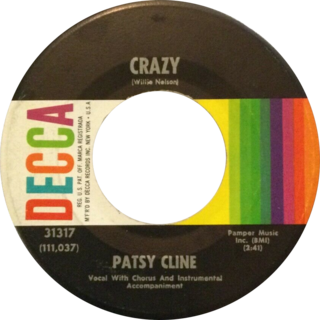
"Crazy" is a song written by Willie Nelson and popularized by country singer Patsy Cline in 1961. Nelson wrote the song while living in Houston, working for Pappy Daily's label D Records. He was also a radio DJ and performed in clubs. Nelson then moved to Nashville, Tennessee, working as a writer for Pamper Music. Through Hank Cochran, the song reached Patsy Cline. After her original recording and release, Cline's version reached number two on Billboard's Hot Country Singles, also crossing to the pop chart as a top 10 single.

Garland Perry "Hank" Cochran was an American country music singer and songwriter. Starting during the 1960s, Cochran was a prolific songwriter in the genre, including major hits by Patsy Cline, Ray Price, Eddy Arnold, and others. Cochran was also a recording artist between 1962 and 1980, scoring seven times on the Billboard country music charts, with his greatest solo success being the No. 20 "Sally Was a Good Old Girl." In 2014, he was inducted into the Country Music Hall of Fame.

America's Music: The Roots of Country is a 1996 three-part, six episode documentary about the history of American country music directed by Tom Neff and Jerry Aronson and written by Neff and Robert K. Oermann. The film touches on many of the styles of music that make up country music, including: Old-time music, Cajun music, Folk music, Rockabilly, Western music, Western swing, the Bakersfield sound, Honky-tonk and the Nashville sound. Country music artist and actor Kris Kristofferson narrates the three-part series.
William Owen Bradley was an American musician, bandleader and record producer who, along with Chet Atkins, Bob Ferguson, Bill Porter, and Don Law, was a chief architect of the 1950s and 60s Nashville sound in country music and rockabilly.
Harold Franklin "Hawkshaw" Hawkins was an American country music singer popular from the 1950s into the early 1960s. He was known for his rich, smooth vocals and music drawn from blues, boogie and honky tonk. At 6 feet 5 inches (1.96 m) tall, Hawkins had an imposing stage presence, and he dressed more conservatively than some other male country singers. Hawkins died in the 1963 plane crash that also killed country stars Patsy Cline and Cowboy Copas. He was a member of the Grand Ole Opry and was married to country star Jean Shepard.

"So Wrong" is a song written by Carl Perkins, Danny Dill and Mel Tillis and popularized by country music artist Patsy Cline. The song was released as a single on Decca Records in 1962 by Patsy Cline.
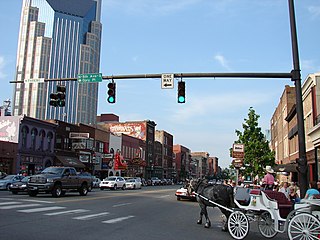
Broadway is a major thoroughfare in the downtown area in Nashville, Tennessee. It includes Lower Broadway, an entertainment district renowned for honky tonks and live country music.
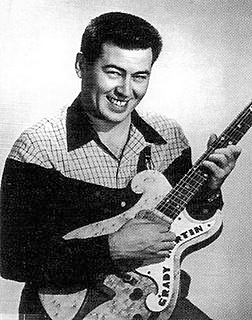
Thomas Grady Martin was an American session guitarist in country music and rockabilly.
Buffy Lawson is an American country music singer formerly part of the music duo Bomshel. Bomshel was started in 2004 by lead singer Buffy "Buf" Lawson and fiddle player Kristy Osmunson, and together they signed with Curb Records. Bomshel's original lineup charted four singles on the Billboard Hot Country Songs charts and recorded an unreleased album called Bomshel Stomp. One of their songs, "The Power of One", was included in the soundtrack to the film Evan Almighty. Lawson departed in December 2007 and began her solo career signed under Wrinkled Records.

"The Part Where I Cry" is a song written by country music singer Willie Nelson. After moving to Nashville in 1960, leveraged by the success of his songwriting, and helped by Harlan Howard, Nelson was signed by Joe Allison of Liberty Records.

"Touch Me" is a song written and recorded by American country music singer Willie Nelson. Leveraged by the success of his songs, Nelson moved to Nashville in 1960. Through songwriter Harlan Howard, Nelson was signed to write for Pamper Music, and to a recording contract with Liberty Records.
Chip Young was an American session guitarist, and later record producer who worked primarily out of Nashville, Tennessee.
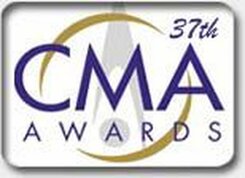
The 2003 Country Music Association Awards, 37th Ceremony, was held on November 5, 2003 at the Grand Ole Opry House, Nashville, Tennessee, and hosted by CMA Award Winner, Vince Gill. Toby Keith lead the evening with 7 nominations, including Album of the Year, and Entertainer of the Year. Alan Jackson and Johnny Cash (posthumously) took home the most awards with 3 each.

"A Church, a Courtroom, Then Goodbye" is a song by American country music singer Patsy Cline. It was composed by Eddie Miller and W.S. Stevenson. It was released as Cline's debut single in July 1955 via Coral Records.
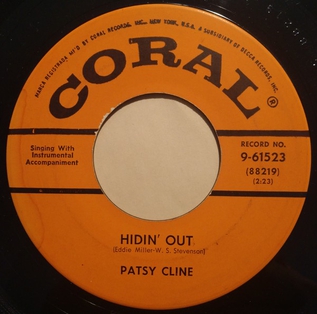
"Hidin' Out" is a song by American country music singer Patsy Cline. It was composed by Eddie Miller and W.S. Stevenson. It was released as the second single in Cline's career and second issued on Coral Records. It originally appeared on the album, Songs by Patsy Cline.















